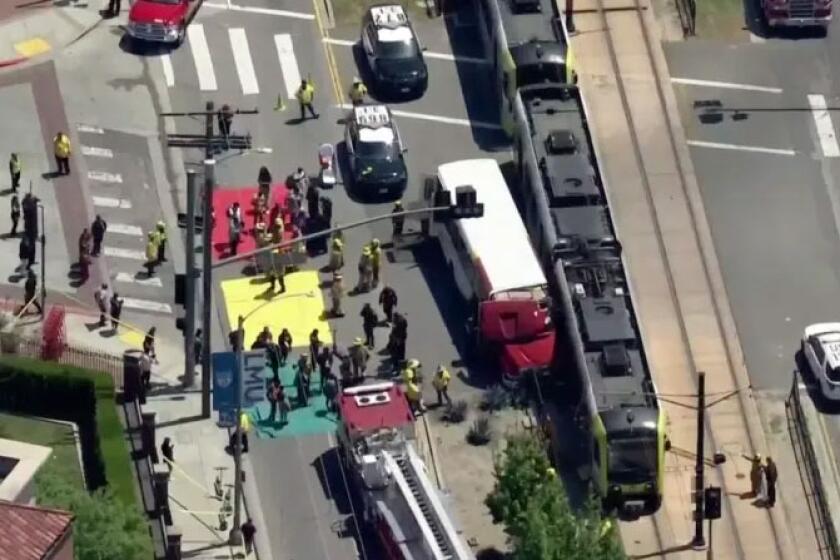Metrolink’s chief executive takes a demotion
The head of Southern California’s regional commuter rail service was replaced Friday in a management shake-up that officials hope will better position the agency to tackle major safety and financial challenges in the wake of last year’s Chatsworth disaster.
FOR THE RECORD:
Metrolink collision: An article in Saturday’s Section A about the demotion of Metrolink Chief Executive David R. Solow said last year’s Chatsworth train accident, which killed 25 and injured 135, was the worst in modern California history. It should have described it as one of the worst; a 1956 crash in Los Angeles killed 30 people and injured 130. —
David R. Solow, the five-county Metrolink agency’s chief executive for more than a decade, agreed to step down and take a new advisory position guiding deployment of a complex safety system intended to prevent a repeat of last year’s crash, which left 25 dead and 135 injured.
The announcement came after a lengthy, closed-door session of agency board members, who had become increasingly critical of management’s handling of spending and budget issues as ridership and revenues have dropped.
For example, board members have said the agency has failed to drive hard bargains in negotiations for large contracts, including one multimillion-dollar award that initially included an 18% profit margin, which was reduced only after board members objected.
The Times reported last month that board frustration over the handling of a highly unpopular fare increase proposal -- coming just months after a previous ticket price increase -- also had intensified questions about Solow’s future leadership role.
As part of the transition, Eric Haley, the former top executive at the Riverside County Transportation Commission, will serve as Metrolink’s interim chief. He will direct the search for Solow’s permanent replacement.
Solow, 57, joined the agency at its formation in the early 1990s. Even after moving to the top spot, he kept a relatively low profile, often avoiding media interviews.
He has won praise for helping steer Metrolink through a period of steady expansion, during which the agency became the nation’s fastest-growing commuter rail service. It now carries about 1 million riders per month on lines stretching from Oxnard to Oceanside and San Bernardino.
But Solow also has come under intense pressure since the Sept. 12, 2008, crash in Chatsworth -- the worst rail disaster in modern California history. Investigators have tentatively blamed a Metrolink engineer who they say ran a red light seconds after he was text messaging on his cellphone. That engineer died in the collision with a freight train.
At federal hearings on the collision earlier this year, Metrolink’s image was badly damaged by further revelations of safety rules violations by train crew members and allegedly lax oversight of operations.
“The guy at the top always has to take some of the blame,” said board member Art Brown, an Orange County representative who recently was involved in Solow’s confidential evaluation. “It’s like the captain of a ship. No matter whose fault it is, it comes come back to him.”
Some board members, notably Los Angeles County Supervisor Mike Antonovich, suggested that Solow was not a strong enough and visible enough leader, including during the initial public response to the Chatsworth disaster, a watershed event not only for the agency but in helping to prompt passage of a groundbreaking federal rail safety law.
“We need to have a director who is proactive, who addresses these problems,” Antonovich said Friday.
If there is a crisis, he said, the director should be someone who is “at the scene of that crisis, to provide that leadership this agency needs.”
Other board members said Solow seems overwhelmed at times by the job and the increased demands of dealing with rebuilding public confidence, managing a mushrooming number of safety improvements and dealing with recent recession-driven financial problems.
On Friday, board member Brown said Solow himself had acknowledged feeling overwhelmed and said he preferred to focus on technical matters.
In a prepared statement read by board Chairman Keith Millhouse, the public emphasis Friday was on Solow’s technological expertise and the contributions he can make to ensuring rapid deployment of a $200-million collision avoidance system, known at positive train control. Such a system could have prevented the Chatsworth crash, experts say.
With Solow focused on such matters, Metrolink can “usher in the era of dramatic enhancements in rail travel in this region and the country,” Millhouse said.
Board Vice Chairman Richard Katz also praised Solow and said the management change was seen by all sides as “the best way for the agency to move forward when we are doing a lot of things.”
Among the immediate challenges, he said, are managing a transition to a new train operating contractor, dealing with costly legal cases arising from the Chatsworth crash and fulfilling a commitment to have the pioneering crash avoidance system up and running in three years.
“We have a lot on our plate,” Katz said.
Solow declined an interview request. In a statement, he said he was looking forward to working with Haley and remained dedicated to enhancing safety and implementing new technologies.
“I am pleased to be able to continue this aspect of the work that I have begun,” he said.
Finals terms of Solow’s contract, which will keep him at the agency full time until at least next June, were not available. But Katz said Solow would continue to receive his current pay, which is $220,000 a year. He said Solow’s knowledge of positive train control is extremely valuable.
“This isn’t, ‘Here’s some money to go away,’ ” Katz said.
Solow will report both to Haley, who is expected to earn slightly less than his predecessor, and the board.
Also on Friday, the board, in a sharply divided vote, put off decisions on the latest 3% proposed fare increase and possible cutbacks of dozens of trains until early next year.
The action could exacerbate a multimillion-dollar shortfall in the current year’s operating budget, officials acknowledged. But a slim majority of members said they wanted to continue exploring other cost-cutting measures and potential sources of new revenue.
More to Read
Start your day right
Sign up for Essential California for news, features and recommendations from the L.A. Times and beyond in your inbox six days a week.
You may occasionally receive promotional content from the Los Angeles Times.






